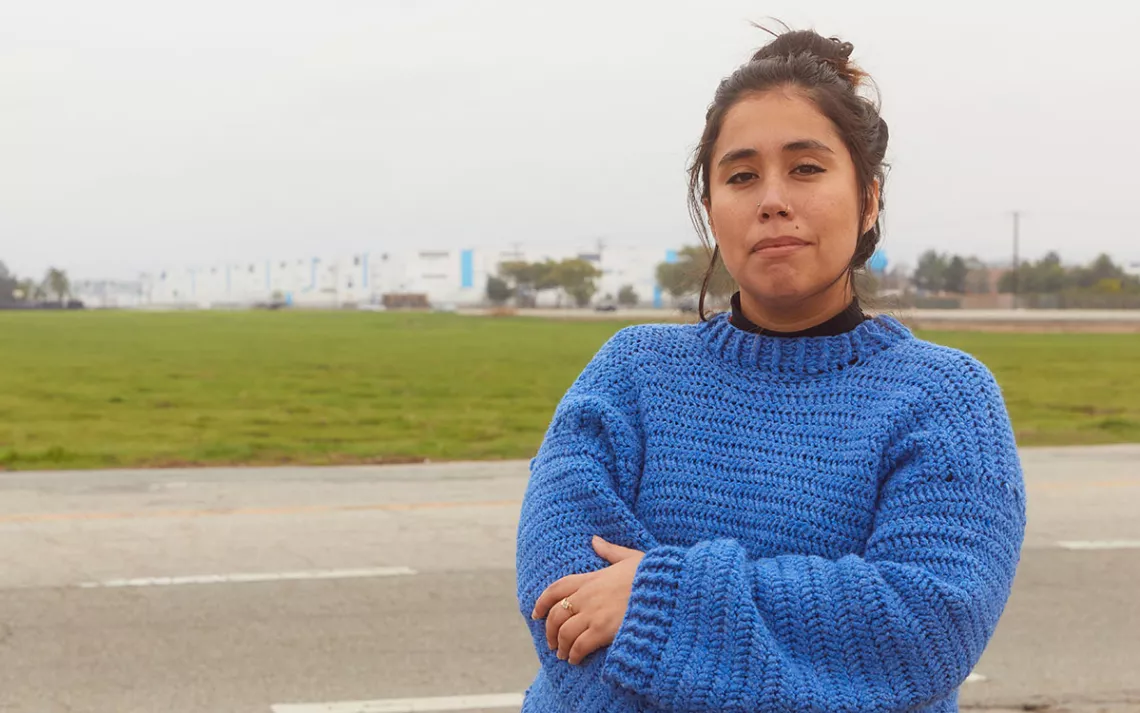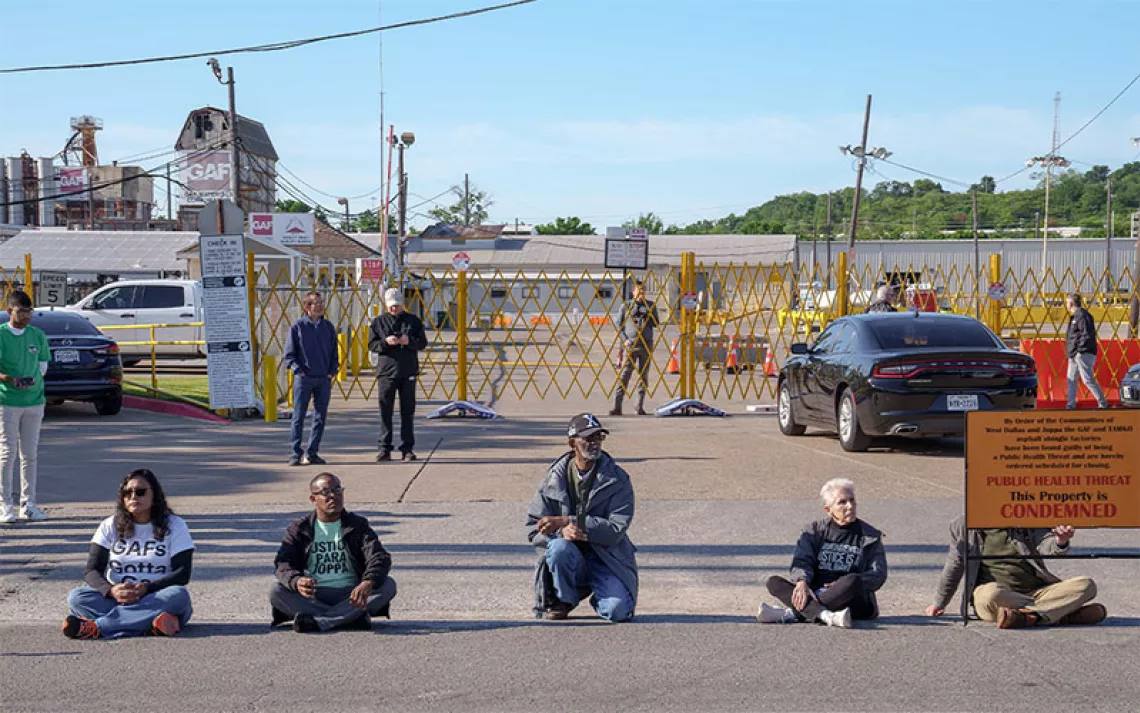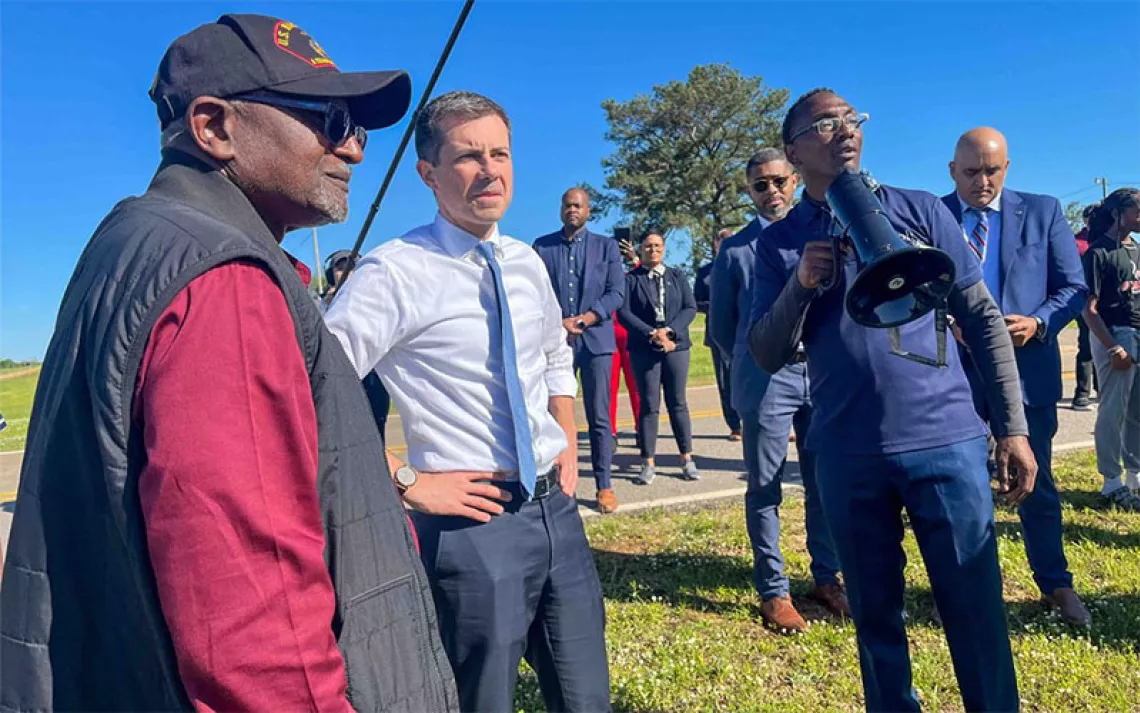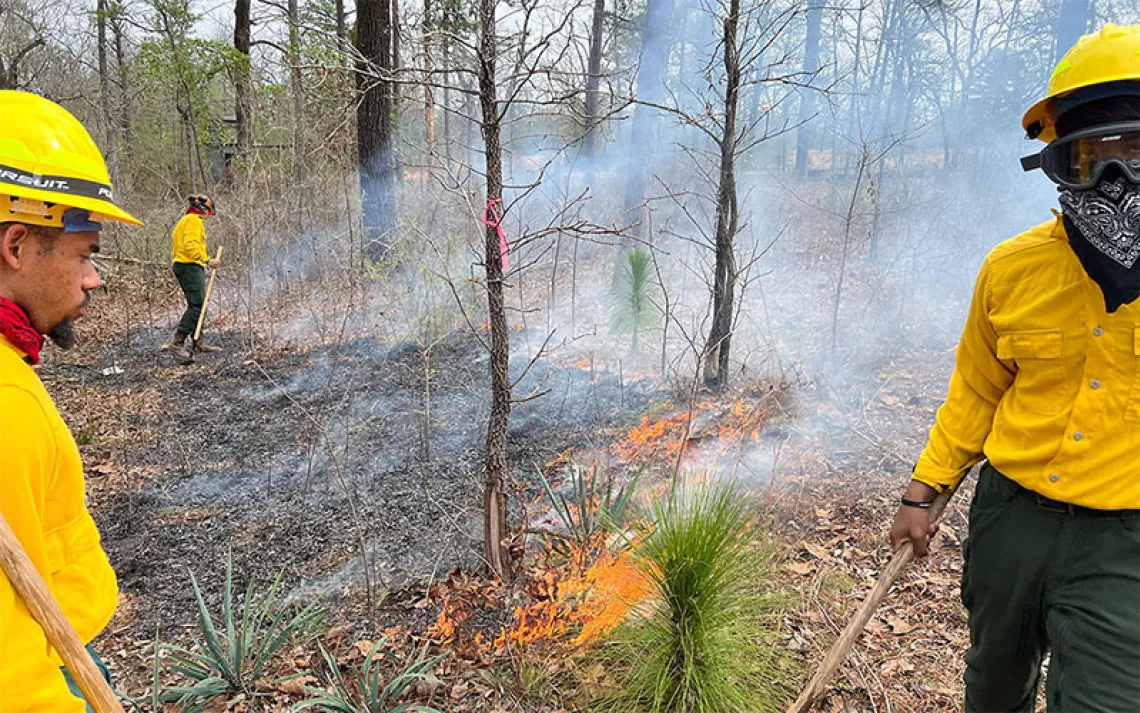Goldman Prize Winner Andrea Vidaurre Campaigns for Clean Air
How a community organizer earned one of the world’s most prestigious environmental awards

2024 Goldman Prize winner Andrea Vidaurre. | Photo courtesy of Goldman Environmental Prize
California’s Inland Empire, located an hour east of Los Angeles, has long been industrial, says 29-year-old Andrea Viduarre, whose family members have worked in the region’s shipping industry as truckers and forklift drivers. But growing up, it was nothing compared to what it’s like these days, Vidaurre says. About a decade ago, “I started to see these giant swaths of concrete take over the area that I grew up in,” she recounts. “They popped up so quickly.” Vidaurre recalls that the traffic started to pick up too. Then she noticed that more of her community members were getting sick.
What Vidaurre was witnessing, she later understood, was the Inland Empire’s transformation into the West Coast’s largest logistics hub, a concentration of warehouses built to keep up with the country’s growing demand for next-day shipping—and what Vidaurre refers to as the “Amazonification” of the US economy. Over the past five years, warehouse growth has averaged 50 million square feet annually. These structures have grown so vast, they can be seen from outer space.
The Inland Empire’s warehousing boom has come with a host of negative health impacts for Vidaurre’s majority Latino and working-class community. These warehouses act as magnets for the half million diesel trucks that come and go daily, spewing “lung-searing” air pollutants, says Sasan Saadat, a senior research and policy analyst with Earthjustice. The region now suffers the worst air quality in the nation, and residents experience significantly higher than average rates of cancer, asthma, and premature death.
Witnessing these impacts served as the catalyst for Vidaurre’s immensely successful community-organizing career. For her dedicated work to protect the health and safety of frontline communities, on April 29, Viduarre was awarded the 2024 Goldman Prize. The prestigious award is bestowed to grassroots environmental activists across the globe for their successful advocacy for environmental issues, ranging from conservation to environmental justice. For Viduarre, that work included getting California leaders to pay attention to and fix the Inland Empire’s toxic air pollution.
“I know people that passed away way too early that had never smoked a day in their life,” Vidaurre says. Just the other day, she heard about a five-year-old from her community who had suffered a heart attack.
Viduarre began her career in activism as a volunteer for a local environmental organization to inform and educate her community about the land-use changes taking place, at which point Vidaurre realized she had a knack for political advocacy. Soon after, during the throes of the pandemic, Vidaurre cofounded the People’s Collective for Environmental Justice, an organization dedicated to finding community-based solutions to environmental racism. In the years following its founding, the collective had some major legislative wins advocating for stronger truck emission regulations from the California Air Resources Board (CARB), which directly benefited the Inland Empire. Still, Vidaurre believed more was possible.
The US is dealing with two compounding crises, Vidaurre explains—a local air quality crisis and the global climate crisis. The transportation sector, she points out, is the largest source of greenhouse gas emissions in the US. “So, we have to address trucking,” she said. Although few others believed it was possible at the time, Vidaurre began to advocate for a complete phaseout of diesel emissions from both the trucking and rail freight industries, a solution that would address both crises simultaneously.
In October 2022, Vidaurre decided to take it up with CARB. She organized a caravan of concerned citizens to drive north to the agency’s offices in Sacramento, where people rallied and testified before board members. Protesters, who ranged from truckers to environmental leaders to electric vehicle manufacturers, rallied outside the board’s offices. They held signs that read, “Workers deserve clean air & safe jobs” and “Stop poisoning our communities. Zero emissions NOW!” At events like that, Vidaurre is on the tips of her toes, Saadat says. “She's not clamoring for the bullhorn—she's passing the bullhorn.” Vidaurre ensures everyone has their talking points, translates testimonies between Spanish and English, and acts as a liaison between the board members and those most impacted.
“Unlike a lot of policy advocates, Vidaurre is also an organizer. So she knows how to mobilize such a diverse set of advocates,” Saadat said. Throughout her career, Vidaurre has vehemently fought for warehouse laborers, who are often excluded from environmental conversations despite being on the front lines of the air pollution crisis.
The broad coalition of advocates that Vidaurre organized to testify before CARB, among them a high school student from the Inland Empire whose dreams of being a professional runner have been stifled by air pollution, made it clear to the board that freight pollution is an environmental justice issue—that human lives are at stake. “The Air Resources Board basically had no choice but to push a much more aggressive rule than they had been considering,” Saadat said.
In April 2023, CARB unanimously adopted the Advanced Clean Fleets Rule and the In-Use Locomotive Rule, a victory that many environmentalists credit to Vidaurre’s advocacy. The new rules commit fleets to begin purchasing an increasing number of zero-emission vehicles starting in 2024 and ensure manufacturers exclusively sell zero-emission trucks by 2036. The In-Use Locomotive Rule also requires railroads to phase out the use of the oldest, dirtiest train engines. Vidaurre, who was in the room when the agency made their announcement, says, “It was very, very surreal. . . . Everyone was just joyous.”
It’s really hard to overstate the importance of these regulations, Saadat says. “For Andrea and her community, it's life or death.” Statewide, policy experts estimate the Advanced Clean Fleets Rule will prevent thousands of premature deaths from pollution and generate $57 billion in health savings by 2050. As recently as 2018, environmentalists saw zero-emission trucks as a “very distant” possibility, Saadat says. However, these new regulations require the freight industry to transition to using zero-emission trucks starting this year. “This is the kind of shoot for the moon climate policy we need all across the board, which, unfortunately, we see way too little of.”
Vidaurre’s fight for cleaner air began in her community, but will inevitably “have profound benefits that ripple way beyond, to California as a whole and to the entire planet,” says Saadat. This is because of California’s Clean Air Act waiver, which allows it to adopt higher standards than federal regulations. Other states can adopt California’s higher air quality standards. “We push California to make the rules as ambitious as possible,” Saadat said. And then we push as many states as possible to adopt the California rule.”
While these regulations marked a critical step in the right direction, Viduarre recognizes that the solution is not as simple as just switching out all diesel trucks for electric trucks. The mining required to manufacture all the batteries for those electric trucks “is just going to create another problem.” Instead, she’s calling for larger structural changes and behavioral shifts. The level of consumerism we have is “unsustainable,” she said. Vidaurre believes we need policies at the federal level that enforce a more regulated, efficient, and safer freight industry. For now, Vidaurre remains committed to what she calls her “forever fight": ensuring all communities have decision-making power over what is built in their backyards.
Though much of Vidaurre’s work requires looking toward changes that feel “far off,” she remains inspired by something a community member once told her: “We might not be able to enjoy the fruits of our labors, but our kids will, and our grandkids will. All that matters is leaving the earth a better place.”
Here are the five other winners of this year’s Goldman Prize:
- Marcel Gomes, from Brazil. Gomes’s investigative reporting exposed how JBS, the world’s largest meatpacking company, is driving deforestation in Brazil. His in-depth research led six major European supermarket chains in Belgium, France, the Netherlands, and the United Kingdom to halt the sale of JBS products.
- Murrawah Maroochy Johnson, from Australia. In 2022, Indigenous activist Johnson organized a legal case that blocked the development of the Waratah coal mine on traditional Wirdi land. The verdict ensured the protection of the 20,000-acre Bimblebox Nature Refuge and set a precedent that enables other First Nations people to challenge coal projects by linking climate change to human and Indigenous rights.
- Nonhle Mbuthuma and Sinegugu Zukulu, from South Africa. These Indigenous activists led a campaign that stopped Shell’s seismic surveys of oil and gas reserves in South Africa’s Wild Coast—a victory that spared ecosystems from severe damage and protected marine life.
- Alok Shukla, from India. Shukla's grassroots campaign to protect the forests in Hasdeo Aranya, India, from coal mining resulted in the cancellation of the 21 proposed coal mines and the preservation of 445,000 acres of biodiverse land.
- Teresa Vicente, from Spain. Vicente’s advocacy efforts to protect the Mar Menor ecosystem—Europe’s largest saltwater lagoon—saved the lagoon from collapse and resulted in the passage of a unique law that grants the lagoon legal rights.
 The Magazine of The Sierra Club
The Magazine of The Sierra Club



